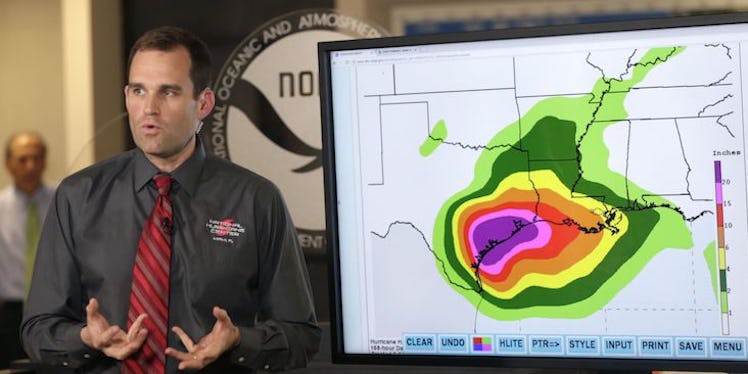
There's A Major Hurricane Heading Towards Texas, And This Is What You Need To Know
Texas is preparing itself for an intense weekend as Hurricane Harvey is expected to touch down in Texas Friday night or early Saturday. The storm was upgraded overnight Thursday to a Category 2 with winds expected to reach 110 mph. Evacuations have been ongoing in many parts of the state, and no matter where you are, here's what you need to know.
How can I follow the storm?
Keep updates on the latest developments from around the region. The Federal Emergency Management Agency posted a list of resources, including accounts to follow, and the National Hurricane Center posts regular advisories for people in the region, including geographical markers indicating what level of advisory applies in each area.
News outlets like Dallas Morning News and CNN have live updates on the hurricane. If you're a visually inclined person, here's where you can track the storm (from a safe distance). For the social media-inclined, follow the hashtag #Harvey2017 and #HurricaneHarvey on Twitter.
How bad is it?
According to CNN, experts are saying it's the worst to hit the U.S. since Hurricane Katrina in 2005. Many are looking towards Harvey's arrival warily after Hurricane Allison, a similar tropical storm that devastated the Houson region in 2001 and was blamed for the deaths of 22 people. According to the New York Times, flooding isn't uncommon in parts of Texas, but many people have been evacuated as the Houston region expects 15 to 25 inches of rain.
As of 1 p.m. ET, the storm was still a Category 2 but on track towards a Category 3 rating, said CNN.
People have been urged to evacuate and prepare accordingly. Grocery store shelves have been wiped out by residents stocking up last-minute for the storm, and many on Twitter posted photos of the vacant aisles.
Jokes aside, some stores in the area, such as HEB, had closed in anticipation of the storm.
The threat of the storm is raising the question of how FEMA will respond to its first natural disaster under the Trump administration. The Times reports that FEMA acquired a new director, Brock Long, in June after being approved by Senate. Long is generally seen as experienced and up to the task.
Houston is a particularly unfortunate place for a hurricane.
An essay in the New York Times last year predicted the aftermath of a fictional Category 5 hurricane that decimated the Texas coast. Author Roy Scranton points out that Houston is the second-busiest port in the country, and any serious damage to this region could spell economic burdens for all of us.
Secondly, Houston is essentially a stockpile of chemicals and oil that could be toxic if released by a storm. Past storms in the region show the potential for massive destruction, both to life and property, and it's pretty concerning (not to mention the possibility of a toxic wave sweeping over your neighborhood).
Climate change has only made matters worse. Scranton quotes local expert Jim Blackburn saying,
Hurricanes are going to get bigger. No question. They are fueled by the heat of the ocean, and the ocean's warming. Our models are nowhere close.
How can I help?
If you not afraid of needles, blood donations are urgently needed in anticipation of the storm. The Salvation Army is also accepting cash donations, and as always, the Red Cross is accepting donations for disaster relief.